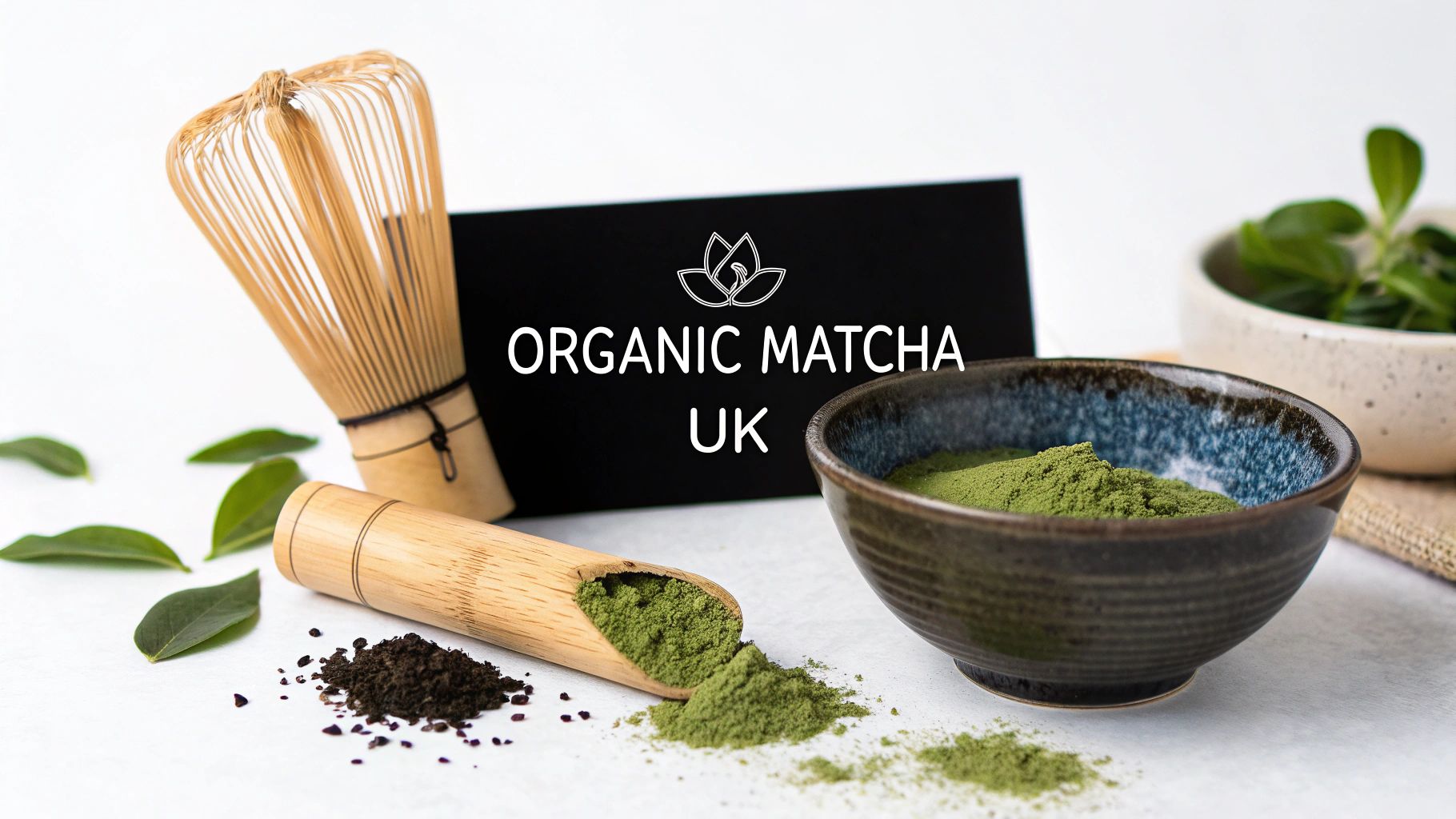When you're searching for organic matcha powder in the UK, you're looking for more than just a tea. You're after that vibrant, electric green powder, milled to a talc-like fineness, that promises an incredible flavour and a host of health benefits. This isn't just a drink; it’s a ritual that offers a sense of calm, focused energy—a world away from the jittery buzz of coffee. To get the authentic experience, you need a matcha that is both ceremonial-grade and certified organic.
Welcome to the World of Organic Matcha
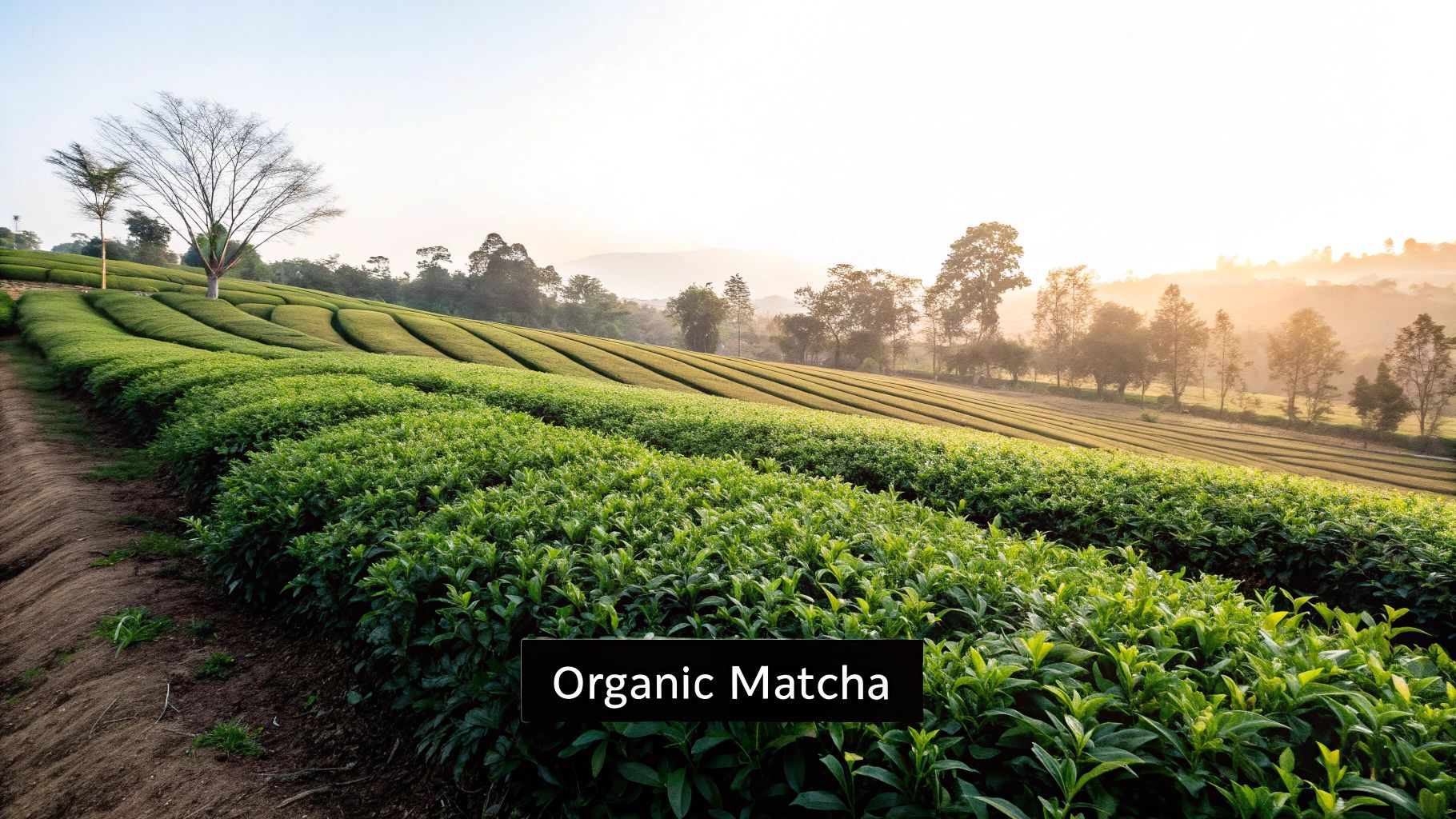
Let's dive into the incredible world of matcha, a cornerstone of wellness that has found a special place in homes right across the UK. It’s so much more than a trendy green latte; true organic matcha is a special kind of tea powder, made from the very best shade-grown green tea leaves.
The magic of matcha lies in how you consume it. Unlike regular green tea where you infuse the leaves in water and then discard them, with matcha you’re consuming the entire leaf. This one simple difference is what unlocks its full potential, turning it into a powerhouse of flavour and nutrients.
This guide is here to pull back the curtain on this ancient Japanese tradition. We’ll follow its journey from a ceremonial staple to a modern-day wellness essential, helping you understand what makes a truly exceptional matcha stand out from the crowd.
What You Will Discover
Think of this as your personal map to confidently choosing the perfect organic matcha powder here in the UK. We're not just talking about another hot drink, but a mindful practice and an amazingly versatile ingredient that can genuinely elevate your daily routine. By the end, you'll have a solid grasp of:
- The Origins: We'll explore the fascinating history behind matcha and its deep-rooted place in Japanese culture.
- The Health Benefits: You'll learn about the unique compounds that deliver that trademark calm, sustained energy and antioxidant boost.
- The Quality Markers: We'll show you how to spot a premium matcha simply by its colour, texture, and aroma.
- The Perfect Brew: You’ll master the simple steps to whisking up a smooth, frothy, and delicious cup right in your own kitchen.
Choosing organic isn't just about a label; it's a commitment to purity. It guarantees that every sip is free from synthetic pesticides and fertilisers, letting the clean, earthy flavour and health benefits shine through without any compromise.
For a more detailed look at the basics, you might want to read our article that explains what is matcha powder and its unique properties. Our ultimate goal is to help you turn each cup you make into a moment of pure, focused energy, transforming a simple drink into a meaningful part of your day.
So, What Actually Makes Matcha 'Organic'?
To really understand matcha, it helps to think about how different it is from the green tea most of us are used to. Picture a standard green tea bag: you’re essentially making an infusion. You steep the leaves, draw out some of the flavour, and then throw the bag away.
Matcha is a whole different ball game. It’s more like eating the whole fruit instead of just drinking the juice.
When you prepare a bowl of matcha, you're whisking the entire tea leaf—which has been meticulously grown and stone-ground into a powder—into water. You consume everything. This simple fact is why matcha packs such a powerful punch of flavour, vibrant colour, and nutrients. It’s all in there.
This whole-leaf approach starts long before the tea is even harvested. The process is steeped in centuries of Japanese tradition, beginning with a unique shade-growing method that makes matcha unlike any other tea.
From Shaded Fields to Stone Mills
The story of a great organic matcha begins in the tea fields of Japan, often in famous regions like Uji, where the climate is perfect for cultivation. About three to four weeks before the spring harvest, a remarkable transformation begins. The tea plants (Camellia sinensis) are carefully covered with dark cloths, shielding them from the sun.
This deliberate shading forces the plants to work overtime to produce chlorophyll. The result? That signature, almost luminous green colour you see in high-quality matcha. It's one of the first things to look for when you want to buy organic matcha powder in the UK—a dull, yellowish green is a dead giveaway of a lower-grade product.
But it’s not just for looks. The shade also ramps up the production of an amino acid called L-theanine. This is the secret behind matcha's savoury, umami depth and its much-loved ability to create a feeling of calm, focused energy.
Shade-growing is where the magic really happens. It’s a delicate balancing act that transforms the tea leaf, creating a complex profile of flavour and powerful natural compounds.
Once the finest, youngest leaves are hand-picked, they’re quickly steamed to lock in that brilliant colour and all the nutrients. Then, they're carefully de-stemmed and de-veined, leaving only the purest part of the leaf, known as 'tencha'. Finally, this tencha is slowly, patiently ground between traditional granite stones into the silky powder we know and love.
What the 'Organic' Label Really Means
Okay, so what happens when we add the word 'organic' to the mix? When you see that certification, it’s not just a buzzword. It's a guarantee of a deeper commitment to purity and sustainable farming, ensuring the entire process is free from any synthetic meddling.
For your matcha, this means:
- No Synthetic Pesticides: This is a big one. Since you’re consuming the whole leaf, you want to be absolutely sure it hasn't been sprayed with chemicals.
- No Chemical Fertilisers: The farmers rely on natural methods like composting to enrich the soil, keeping it healthy for years to come.
- A Promise of Purity: Ultimately, organic certification means what you're drinking is clean and untainted. It lets the true, delicate flavours of the tea come through without any interference.
This shift towards natural cultivation is making waves. The global market for organic matcha powder is valued at around USD 850 million in 2025, and Europe, including the UK, is a huge part of that. It's being driven by health-aware millennials and Gen Z who want to know what's in their cup. If you're interested in the data, you can read more about the global rise of organic matcha and what’s behind its popularity.
Choosing organic isn't just a trend; it's about backing a system that delivers on quality and purity, making sure every single sip is the authentic experience it’s meant to be.
The Science Behind Matcha's Health Benefits
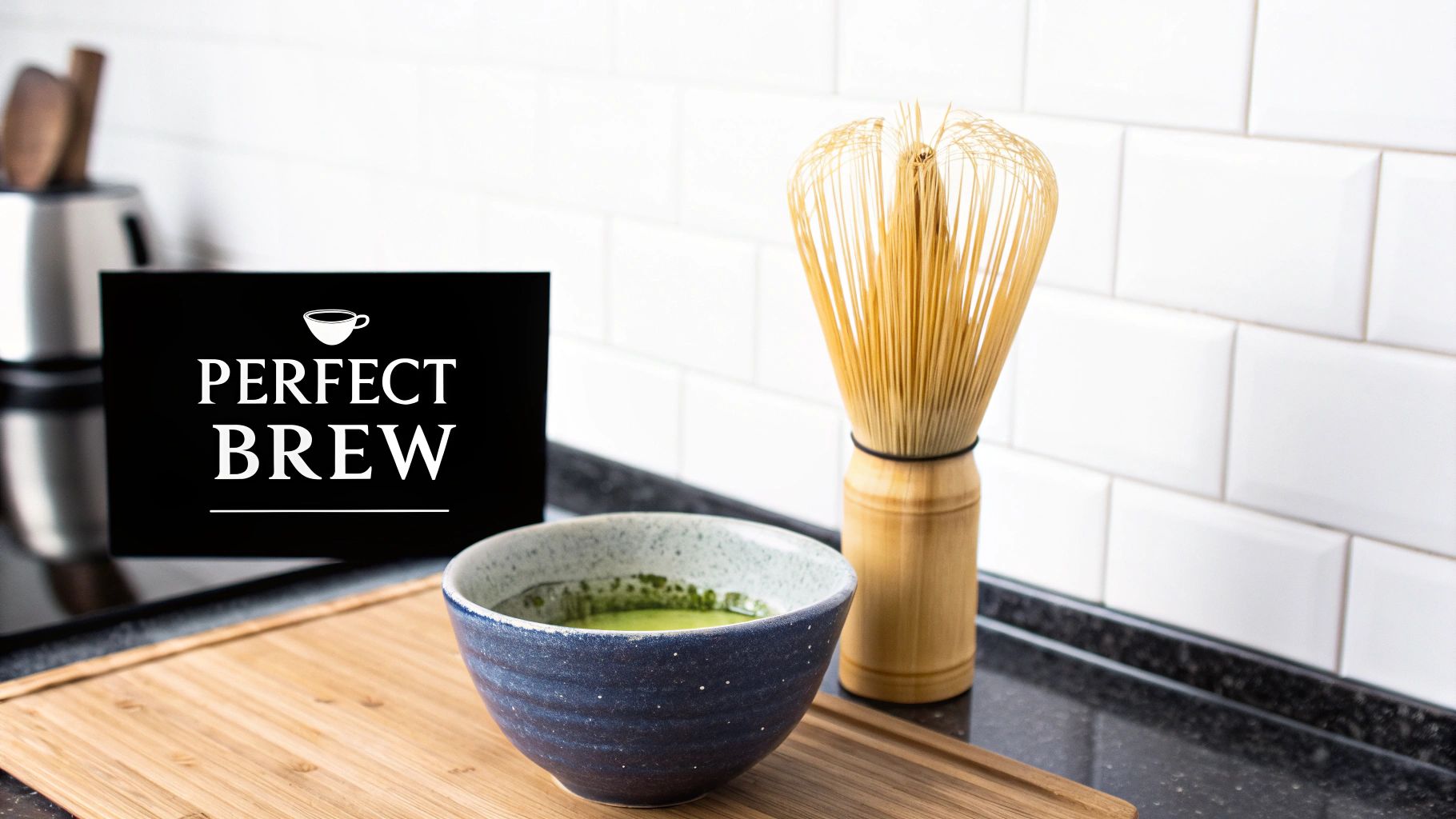
While the striking green colour and deep, umami flavour are what first draw you in, the real magic of matcha is happening on a molecular level. Unlike other teas where you just infuse the leaves, with matcha, you’re consuming the entire leaf. This simple difference means your body gets a concentrated flood of powerful compounds working together to elevate how you feel, both mentally and physically.
This isn't just about hydration; this is a daily ritual backed by compelling science. It all comes down to two superstar compounds found in abundance in high-quality organic matcha powder: L-theanine and a group of antioxidants called catechins.
These two are the reason matcha feels so different from your morning coffee. They're behind its signature ability to create a state of calm, focused energy that more and more people across the UK are looking for.
L-Theanine for Calm Alertness
Ever had that jittery, on-edge feeling from a strong coffee, followed by the inevitable afternoon slump? L-theanine is matcha’s built-in solution to that very problem. It's an amino acid that gets supercharged during the shade-growing process, and it has a fascinating effect on our brainwaves.
Think of L-theanine as a smooth-operating conductor for your brain. It encourages the production of alpha waves, the same kind your brain produces when you're in a state of relaxed wakefulness, like during meditation.
The result is a feeling often described as ‘calm alertness’. The caffeine is certainly there, but the L-theanine acts as a moderator, slowing its absorption into your system. This gives you a gentle, sustained energy lift for 3-6 hours, completely sidestepping the sharp spike and crash.
This unique partnership delivers some fantastic cognitive perks:
- Sharper Focus: It helps you concentrate without feeling wired or anxious.
- Better Memory: It supports the cognitive functions tied to learning and remembering things.
- Less Stress: By encouraging a relaxed state, it can help take the edge off feelings of anxiety.
It’s no wonder Buddhist monks have used matcha for centuries to stay alert yet serene through long hours of meditation.
EGCG: The Antioxidant Powerhouse
Beyond the mental clarity from L-theanine, organic matcha is an absolute fortress of antioxidants. The most potent and plentiful of these is Epigallocatechin gallate, or EGCG for short, which is a type of plant-based compound known as a catechin.
You can think of antioxidants as your body's personal clean-up crew. They get to work neutralising unstable molecules called free radicals, which can cause damage to our cells and contribute to ageing and chronic diseases. Because you drink the whole tea leaf, matcha delivers these protective compounds in incredibly high amounts.
Matcha can contain up to 137 times more antioxidants than some conventionally brewed green teas. This huge difference really brings home why drinking matcha is a far more powerful way to bolster your body's natural defences.
This antioxidant punch is a massive reason for matcha's surge in popularity. The UK matcha market is tapping into a global trend of people seeking out products with clear health benefits, like a supported metabolism and gentle detoxification.
Supporting Metabolism and Detoxification
The powerful catechins in matcha, especially EGCG, also lend a hand to your body’s metabolic processes. Studies have shown they can help give your metabolism a nudge, increasing the rate at which your body burns calories. This makes matcha a brilliant partner for a healthy, active lifestyle.
Then there's the chlorophyll—the very pigment that gives matcha its vibrant green hue. Chlorophyll is known for its detoxifying properties, helping to bind to heavy metals and other toxins to flush them from your system.
By choosing a high-quality organic matcha powder, you’re ensuring you get the purest form of all these fantastic compounds. To get a closer look at its makeup, have a read of our guide on what is in matcha powder. Every bowl of Amatsu Matcha offers a potent blend of these elements, turning your daily cuppa into a true ritual for both your mind and body.
How to Spot High-Quality Organic Matcha
Stepping into the world of matcha can feel a bit overwhelming, especially when you’re on the hunt for genuine organic matcha powder in the UK. With a sea of options out there, how can you tell the good stuff from the rest? It all comes down to using your senses to spot four key signs of quality: vibrant colour, silky texture, authentic origin, and fresh aroma.
Learning to recognise these markers is the secret to becoming a savvy matcha buyer. It’s the difference between a dull, bitter powder and a premium matcha that delivers that incredible smooth, umami flavour and a host of health benefits. Once you know what you're looking for, you'll never go back.
Judge by Colour
The very first thing you'll notice about high-quality matcha is its colour. Your eyes are your most reliable guide here. Premium, ceremonial-grade matcha boasts a vibrant, almost electric green hue. This stunning colour isn’t just for show; it's a direct result of the meticulous shade-growing process, which floods the tea leaves with chlorophyll.
If you see a powder that looks dull, swampy, or yellowish-green, that's a major red flag. This usually means the matcha was made from older, lower-grade leaves, or it has been poorly stored and has oxidised. For the real deal, always seek out that brilliant green.
Feel the Texture
Next up is the texture. The best organic matcha is slowly stone-ground into a powder so fine it’s almost unbelievable, with particles measuring just 5-10 microns. To put that in perspective, that’s finer than a particle of smoke.
When you rub a pinch between your fingers, it should feel as smooth and silky as cornflour. There should be absolutely no grit. This super-fine consistency is what allows the matcha to dissolve seamlessly in water, creating a creamy, frothy drink without any unpleasant clumps. A coarse texture is a dead giveaway of a lower-grade product that will probably make for a lumpy, disappointing brew.
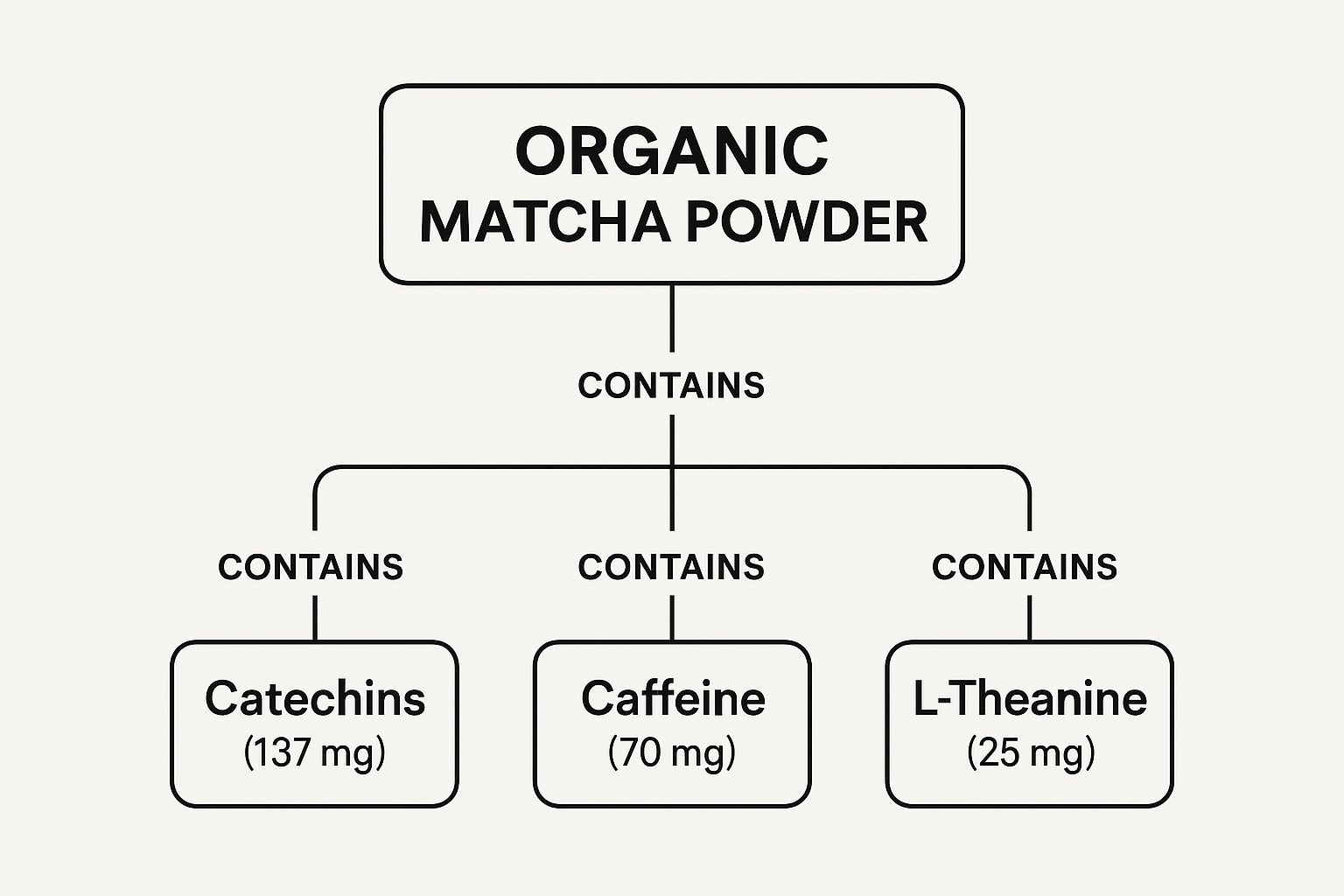
This image gives you a fantastic visual breakdown of the powerful combination of catechins, caffeine, and L-theanine. It's this unique trio that gives premium matcha its famous ability to boost your energy while keeping you calm and focused.
Check the Origin and Aroma
Authentic matcha has only one home: Japan. Renowned regions like Uji (near Kyoto) have been the heartland of the finest ceremonial-grade matcha for centuries. Always check the packaging to confirm a Japanese origin. Powders produced elsewhere are simply not true matcha and will be missing that distinctive flavour profile you’re looking for.
Finally, let your nose be the judge. Open the tin and take a good sniff. High-quality matcha should smell fresh and inviting—think grassy, vegetal, and slightly sweet with a rich umami depth. If the aroma is flat, dusty, or just plain bitter, it's a clear sign of a poor-quality or stale product.
To truly appreciate matcha, you have to embrace the full sensory experience. From the moment you see its vibrant colour to the last smooth sip, every detail reflects the centuries of care and tradition that went into creating it.
To make things even clearer, let’s quickly break down the key differences between the two main grades you'll encounter. And for an even deeper dive, be sure to check out our complete guide on how to find the best quality matcha.
Ceremonial vs Culinary Matcha Comparison
This table offers a simple at-a-glance comparison to help you tell ceremonial and culinary grades apart instantly.
| Attribute | Ceremonial Grade (High Quality) | Culinary Grade (Lower Quality) |
|---|---|---|
| Colour | Vibrant, electric green | Dull, yellowish, or brownish-green |
| Texture | Silky, fine powder (like talcum) | Coarse, gritty, and clumpy |
| Aroma | Fresh, grassy, and sweet umami | Flat, dusty, or overly bitter |
| Origin | Exclusively from Japan (e.g., Uji) | Often from other countries or unclear |
Ultimately, choosing ceremonial grade means you're investing in a superior taste, texture, and overall experience, while culinary grade is better suited for cooking and baking where its stronger flavour can hold its own against other ingredients.
Preparing Your Perfect Cup of Matcha
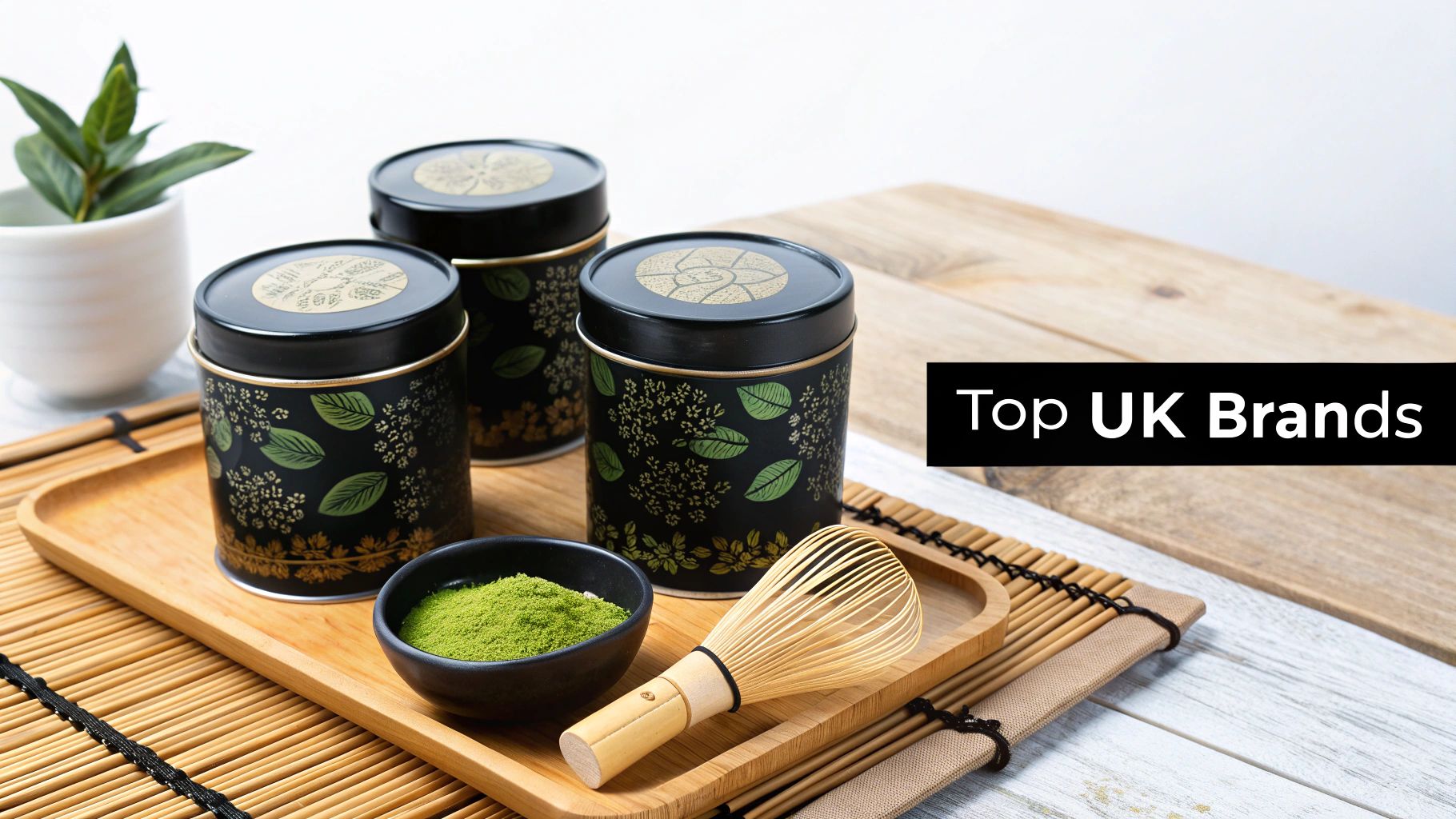
Making your own cup of organic matcha shouldn't feel like a chore; think of it as a calming ritual. While a full Japanese tea ceremony is a beautiful art form, whipping up a frothy, delicious bowl at home is surprisingly simple. It really just comes down to a few key details that make all the difference.
The whole point is to create a smooth, vibrant drink that’s completely free of clumps. This is what allows the rich, umami flavour of high-quality organic matcha powder UK to really shine. With the right tools and a bit of know-how, you can easily make this superfood a cherished part of your daily routine.
The Traditional Method, Step by Step
There’s something wonderfully mindful about preparing matcha the traditional way, connecting you to centuries of Japanese culture. And the best part? It only takes a couple of minutes and a few simple tools.
Here’s how you do it:
-
Sift Your Matcha: This is the one step you absolutely shouldn't skip if you want a clump-free drink. Use a small, fine-mesh sieve to sift 1-2 grams (about half to one teaspoon) of matcha powder into a wide-bottomed bowl. This simple action aerates the powder, helping it dissolve beautifully.
-
Add Hot Water: Next, pour about 60-80 ml of hot water over the powder. The magic number for temperature is around 80°C (175°F). Be careful not to use boiling water, as it will scorch the delicate tea, leaving you with a bitter taste.
-
Whisk Vigorously: Grab your bamboo whisk (called a chasen) and get to it. The trick is to whisk in a rapid, zig-zagging 'W' motion—not in circles. Keep this up for about 20-30 seconds until all the powder is dissolved and a gorgeous, delicate foam forms on top.
That’s it! This method creates a wonderfully smooth and authentic bowl of matcha, perfect for savouring just as it is.
Modern and Convenient Alternatives
Don't have a traditional whisk? No problem at all. You can still whip up a fantastic cup of matcha using tools you probably already have. An electric milk frother, for instance, is a brilliant modern substitute.
Just add your sifted matcha and hot water to a mug and use the frother to blend it until it's smooth and foamy. It’s quick, easy, and works especially well for making lattes.
The secret to a perfect cup isn’t about having fancy equipment; it's about getting the technique right. Sifting the powder and using water that’s not too hot are the two non-negotiable steps for a delicious brew every time.
For a more detailed walkthrough, our guide on how to prepare matcha has some extra tips and tricks to help you master the art.
Beyond the Bowl: Creative Matcha Ideas
Once you’ve nailed a basic matcha tea, you can start having fun with it. Matcha’s unique flavour is incredibly versatile and pairs wonderfully with all sorts of ingredients.
- Creamy Matcha Latte: Prepare your matcha as usual but use just a splash of water to create a concentrated "shot." Then, simply top it up with your favourite steamed milk. Oat, almond, and coconut milk are all fantastic choices. If you like it a bit sweeter, a drizzle of honey or maple syrup works a treat.
- Energising Matcha Smoothie: For a powerful and nutritious breakfast, blend a teaspoon of matcha powder with a banana, a handful of spinach, a scoop of Amatsu Matcha Strength with creatine, and a splash of plant-based milk. It’s the perfect way to kickstart your morning with clean, sustained energy.
By mastering these simple methods, you unlock a world of wellness. It makes enjoying the incredible benefits of this green superfood an easy and enjoyable part of any day.
Choosing Your Organic Matcha in the UK
So, now you’re armed with some serious matcha knowledge. You know what to look for—that electric green colour, the baby-powder-fine texture, and the all-important Japanese origin. The next step is putting that knowledge into practice and finding a brand that truly delivers on all those promises.
At Amatsu Matcha, our entire philosophy is built on a deep respect for tradition and a non-negotiable commitment to quality. We don’t just sell matcha; we’re passionate about bringing a genuine piece of Japanese tea culture right into your home.
Our quest for the perfect matcha took us straight to the source: the historic tea fields of Uji, Japan. This is the heartland of ceremonial-grade tea, and it’s here that we found incredible family-run farms who have been perfecting organic cultivation for generations. By working directly with them, we can guarantee that every tin is filled with only the finest, first-harvest tea leaves, grown completely free from synthetic pesticides or fertilisers.
From Uji, Japan, Direct to Your Door
Every single batch of Amatsu Matcha reflects our incredibly high standards. The tea leaves are carefully shade-grown to boost their chlorophyll and L-theanine content—that’s where the magic happens. Then, they are meticulously stone-ground into that signature, ultra-fine powder. This is essential for creating a matcha that isn’t just pure, but also has that smooth, umami-rich flavour that sets a truly great brew apart.
For our customers in the UK, we've focused on making this authentic experience as simple and accessible as possible. You get to enjoy world-class, certified organic matcha without the hassle, all with fast and reliable local delivery.
Our mission is simple: to provide an authentic, high-grade matcha experience that honours its Japanese roots while fitting seamlessly into your modern wellness routine. This is where your search for premium matcha ends.
Blends Formulated for Your Wellness Goals
We also understand that everyone's wellness journey is different. That’s why we’ve gone a step further and created functional blends using our ceremonial-grade matcha as the powerful base, helping you target specific goals:
- Pure: Our classic, ceremonial-grade matcha for the ultimate traditional experience.
- Radiance: Infused with marine collagen to support vibrant skin, hair, and nails from the inside out.
- Strength: Fortified with creatine to help boost physical performance and aid muscle recovery.
- Shrooms: A powerful blend with Lion's Mane and Chaga mushrooms for enhanced focus and immune support.
It's clear that the UK is falling in love with high-quality matcha. The market is projected to grow from USD 340 million in 2025 to almost USD 790 million by 2031, which shows just how much people are prioritising their health. You can read more about the expanding UK matcha market to understand why choosing a quality product is more important than ever.
If you’re still exploring your options, our guide on where to buy matcha tea powder has even more tips to help you make the right choice.
Your Matcha Questions, Answered
Starting something new always brings up a few questions, and that's a good thing! It shows you're curious and want to get it right. To make sure you feel completely comfortable welcoming matcha into your daily life, we've gathered some of the most common queries we get about organic matcha powder UK.
Let's tackle those last few lingering thoughts so you can get straight to the good part: enjoying that first vibrant, energising cup.
How Does the Caffeine in Matcha Compare to Coffee?
This is a big one, and the numbers don't quite tell the full story. A standard serving of matcha has about 30-70mg of caffeine, while a typical cup of coffee lands closer to 95mg.
But here's the magic of matcha: its caffeine is paired with an amino acid called L-theanine. This incredible duo works together to give you a slow, steady release of energy over 3-6 hours. It's a feeling of calm, focused alertness—none of the jitters or the dreaded afternoon crash you often get from coffee.
Is it Okay to Drink Matcha Every Day?
Absolutely! For most people, one or two servings of organic matcha a day is a brilliant habit for your overall wellness, thanks to its huge antioxidant payload. It's a fantastic way to support your body.
The most important thing, as with anything, is to listen to your body. When you choose a certified organic, ceremonial-grade matcha like Amatsu, you know you're getting a pure, high-quality product every time, with no nasty chemicals.
Storing your matcha correctly is just as important as brewing it. It protects the delicate compounds responsible for that signature flavour and all those health benefits, making sure every cup is as perfect as the last.
What's the Best Way to Store Matcha Powder?
Matcha is sensitive stuff. Its biggest enemies are light, heat, and air, which can quickly degrade its quality. To keep that beautiful green colour and rich, umami flavour, proper storage is key.
Simply keep your matcha in an airtight container in a cool, dark place—the fridge is perfect. Once you've opened it, try to use it within a couple of months to experience it at its absolute best. Taking this little step ensures your investment in a top-quality matcha pays off with every single sip.
Ready to feel the pure, focused energy of authentic Japanese matcha for yourself? Take a look at the Amatsu Matcha collection and find the perfect blend to elevate your daily ritual. Discover our premium ceremonial-grade matcha, sourced directly from Uji, Japan, at the Amatsu Matcha online store.
Read more
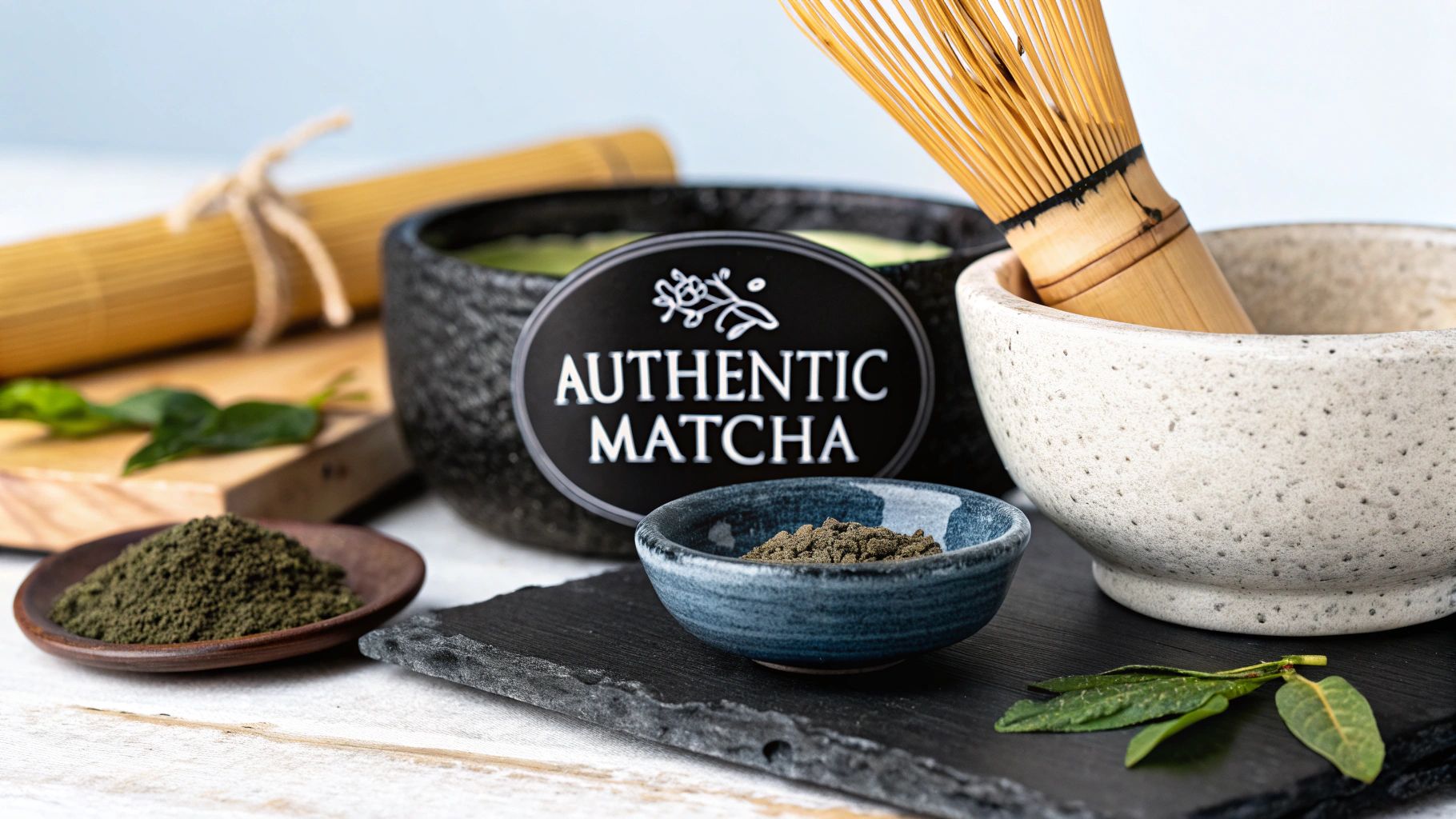
Discover authentic matcha powder from Japan. Our guide explores quality grades, health benefits, and how to brew the perfect cup for a genuine experience.
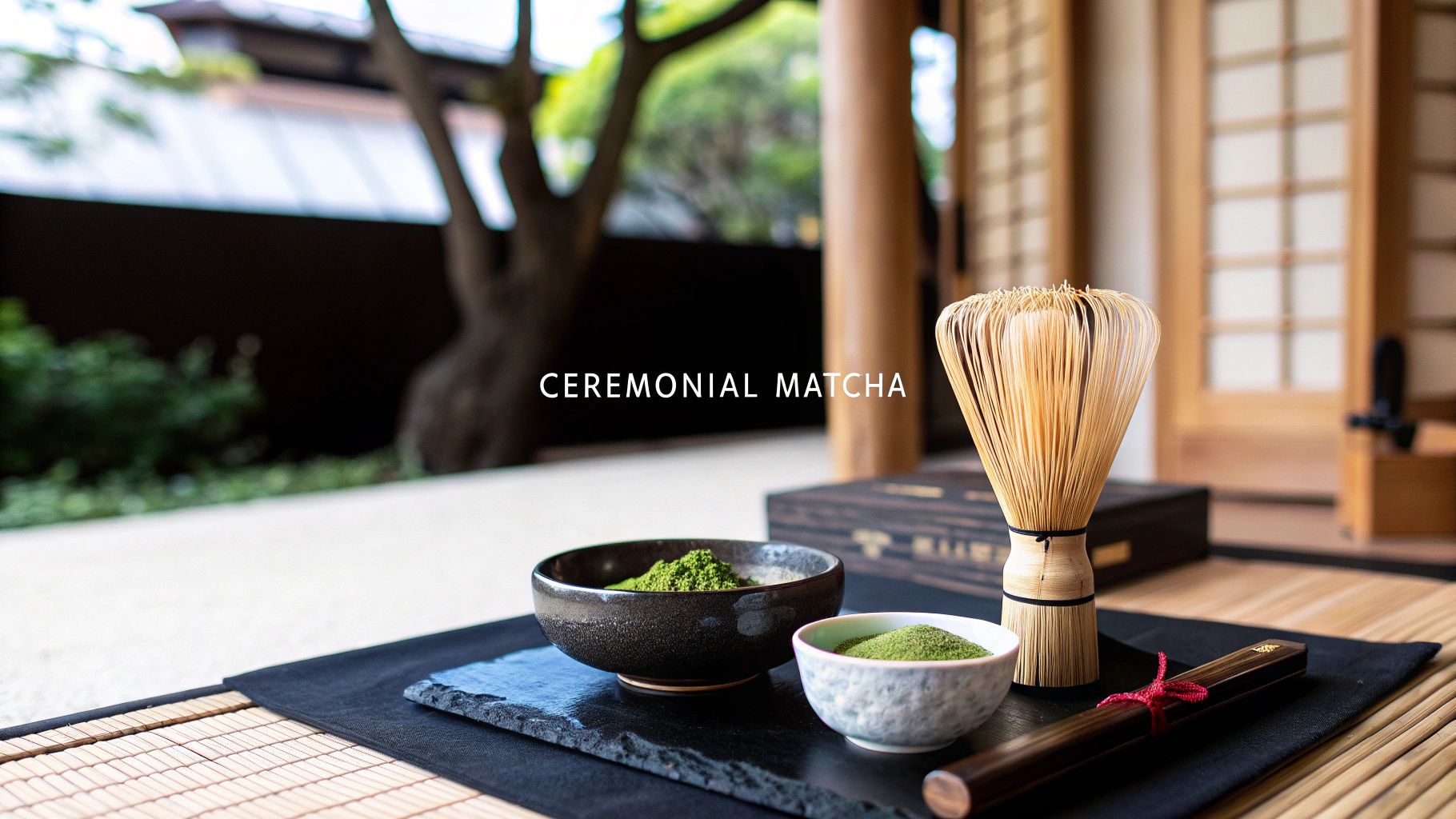
Discover what sets matcha ceremonial grade apart. Learn how it's made, its benefits, and how to prepare the perfect bowl for an authentic experience.
